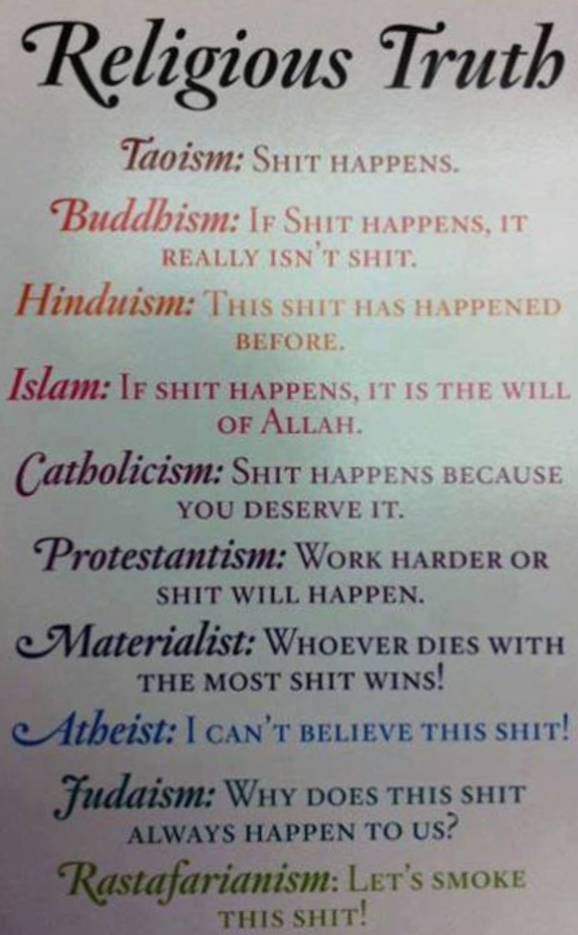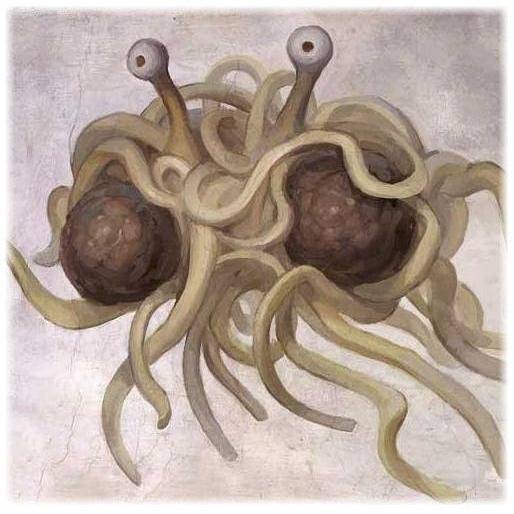The Earth's religions: the big ones:
- Christianity
- Islam
- Hinduism
- Buddhism
Christianity grew out of a much older religion called Judaism. Jews don't eat the meat of pigs (even thought it is perfectly harmless so long as it is cooked) and cut bits off their male babies' penises (even though there is no medical advantage in doing so).
| |||
| |||
|
Islam grew out of Christianity and Judaism. The follows of Islam, called Muslims, think that Christians and Jews got a fair bit right; for example, they all think there is only one god.
Again, the dangers of generalisation: Christians think there is only one god, but he comes in three different bits: God the Father, God the Son, and God the Holy Ghost. (I know, it's hard to believe, but it's true, it's all true; they do believe this.)
The main difference is that Muslims think that a bloke by the name of Mohamed got a personal conversation going with god and, for some reason, god gave Mohamed all the rules-to-live-by. Why god didn't give all these rules to absolutely everyone on the planet is never explained; I repeat, abandon reason all ye who enter here.
Muslims don't eat pigs, don't much like dogs, and do cut bits off their male childrens' penises; and some of them don't leave their girl babies intact either.
All three lots, Jews, Christians and Muslims, believe that if anything is enjoyable – like sex – it must be a sin: that is, must be somehow abhorrent to god. So they have to work at making sex less fun. Of course the people who make the rules in Islam are the men, so they do their best to see that women, in particular, get minimal enjoyment out of sex.
|
|
I said that there is Christianity and there is Islam. (Generalising again!) In fact there are many different versions of both. The Christians did a very good job of keeping everyone on the same track for the first several hundred years after Christianity was made the official religion of the Roman Empire by a simple expedient: cruelly killing those who thought that they wanted a slightly different version of the same thing. Tying these people to a pole and building a fire under them was a favourite. (Oh, I forgot to say, the man who started Christianity, usually called Jesus although his name was actually Joshua, was very insistent that the religion he taught was all about peace, love, kindness, forgiveness, and not condemning people. Astute readers may see an inconsistency here.)
Islam, like Christianity, is, according to most of those who follow it, a religion of peace. (According to Sharia – Islamic religious law – a person who steals should have his hand cut off, adulterers need to be stoned to death and if a person renounces Islam he should be killed. Some readers may not see this as particularly peaceful.) There are two main divisions of Islam: Sunni and Shia. The two divisions broke away from each other not long after Mohamed died and they've been at each other's throats on and off for the last 1300 or so years; they are at it again in parts of the Middle East at present.
The Christians feel superior in this.
They mainly don't kill each other (any more) over differences in their
interpretation of their religion.
They got most of that out of the way in a period called the Reformation;
that was a blood-bath!
One group, called the Catholics, did what they could to wipe out the other
group, called the Protestants, and vice-versa.
I need to say here that while the Catholics are a fairly united bunch, under
one leader, their present leader is called Papa Francesco (he's a bonzer
bloke!), the Protestants come
in enormous variety – there are just about as many versions of
Protestantism as there are Protestants; oh, and then there are the Orthodox
Christians (mainly in Greek and Russian versions), who parted ways with the
Catholics even before the Protestants came along.
I think that the Catholics didn't kill them all off because they, the
Orthodox Christians, became dominant in a different part of the world to
where the Catholics held sway.
Then, as I said, there are the Hindus and the Buddhists.
The Hindus don't mess about with one god; they have about 36 million gods (36 million and 4 by one count). The Buddhists are a funny lot, I think that they share the gods of the Hindus, but they don't seem to take gods very seriously; they venerate a bloke who they call Buddha (no surprise there, when you remember they are called Buddhists!).
Both Hindus and Buddhists believe that after people die, a part of them called the soul comes back to earth in another body. The Buddhists believe that this tiresome rebirth, over and over and over again, can come to an end if people learn – from the teaching of Buddha – how to live a perfect life.
Most of these people, Jews, Christians, Muslims, Hindus and Buddhists believe that the soul somehow can carry the person's essence even though it is immaterial and no-one has ever seen a soul, and they somehow manage to overlook the fact that the whole idea of a soul that can live without a body is absurd.
At this point you've probably got a rough idea of the world's religions, and I've written about as much as I can handle!


